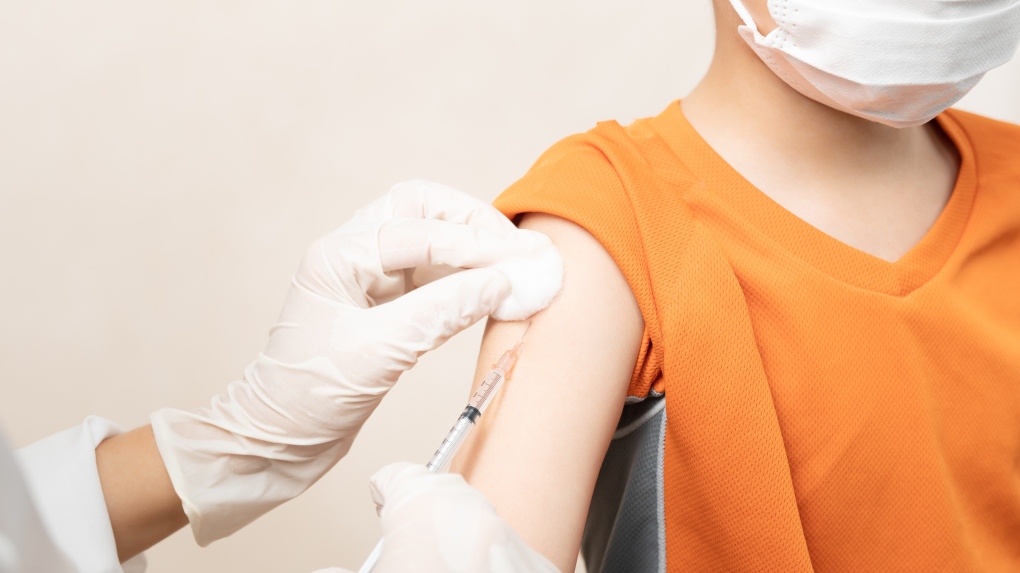Vaccine-fearing B.C. dad can't share COVID-19 social media posts with child, court rules
 (Shutterstock)
(Shutterstock)
A B.C. judge has ordered a vaccine-fearing father not to share any social media posts related to COVID-19 with his young child.
In a ruling published online this week, Judge Cathaline Heinrichs also barred the dad from discussing COVID-19 vaccination with his 11-year-old son, or supplying the child with "other information about the vaccine or the disease."
The case began as yet another deadlocked dispute between two parents at odds about whether to inoculate their child during the pandemic.
The mother, identified as T.K. in the decision, asked Kelowna provincial court to order her former partner, J.W., to co-operate in the vaccination of their son, N.W.
She also wanted the father banned from spending time indoors with their child unmasked, unless he should agree to get vaccinated as well. The parents have been separated since 2016.
Heinrichs ultimately sided with the mother, giving her sole authority on the question of the boy's vaccination, but only suspended J.W.'s parenting time until the child has received his first dose.
As in previous cases covered by CTV News, the anti-vaccination parent, who worries the extremely rare risks associated with the vaccine outweigh the benefits, failed to present a convincing argument in court.
According to the decision, J.W. put forward a number of "documents, links and purported expert opinions attempting to support the inefficacy of the COVID-19 vaccine," none of which was taken into serious consideration by the judge.
"There are problems with the admissibility of information that is printed from the internet or is submitted with the intent of offering an opinion to the court, without meeting the requirements of expert evidence," Heinrichs wrote.
To win these types of disputes, family lawyers have cautioned vaccine-fearful parents would need to bring compelling evidence that vaccination poses a serious risk of harm to their child – a high bar, particularly when their family doctor sees no cause for concern.
T.K. provided a letter from their physician stating N.W. has no medical conditions that would make the approved COVID-19 pediatric vaccine harmful to him.
Generally, on the issue of childhood vaccination, multiple Canadian courts have deferred to public health authorities, finding those government bodies better positioned to decide whether vaccines are safe and beneficial than judges.
Heinrichs did the same, summarizing the view of health officials as: "The COVID-19 vaccine is safe and recommended for use by adults and children, to help prevent the spread of the virus."
The judge also considered the child's feelings, but heard different stories from each parent. The father claimed the boy worries the vaccine has not been tested on enough people – something Heinrichs noted is verifiably untrue, given that billions of doses have been administered worldwide – while the mother said N.W. is willing to be vaccinated, but worries how his dad would react.
"I am satisfied that N.W. is aware of his parents’ different views, and this must be stressful for him because if he makes the decision, he is either deciding with his father against his mother, or vice versa," the judge wrote.
The difficult position faced by the 11-year-old, and the finding that his mother is best suited to decide this particular health matter, led to the order prohibiting the father from discussing COVID-19 vaccines with the child.
Citing the "tension and polarization" the issue has caused between the parents, Heinrichs also made an order barring T.K. and J.W. from speaking negatively about each other in front of their son.
CTVNews.ca Top Stories

'Thankful for the rest of my life': Woman's final goodbye with father captured on video at Winnipeg airport
One woman is expressing her deepest gratitude to the Winnipeg Richardson International Airport after the staff helped her retrieve the security footage of her final moments with her father.
A father who stayed by his son's bedside were among the victims in California's wildfires
An amputee and his son with cerebral palsy were among the 11 deaths in the fires raging around Los Angeles. The father was found at his son’s bedside.
Lone sailor trapped in ice sparks concern in Southern Georgian Bay
A lone sailor living on a sailboat trapped in the Georgian Bay ice has sparked concern among Penetanguishene residents.
Former B.C. premier says she 'misspoke' when claiming she was never a Conservative
Former British Columbia premier Christy Clark, who is considering a run for federal Liberal leader, has backtracked on her claim this week that she'd never been a member of the Conservative party.
U.S. special counsel Jack Smith has resigned
U.S. Special counsel Jack Smith has resigned from the Justice Department effective Friday, according to a court filing.
UPDATED Anita Anand will not seek Liberal leadership
Transport Minister Anita Anand announced on social media Saturday she will not seek the leadership of the Liberal Party, nor will she run for re-election in the riding of Oakville.
This Canadian teen lost her hands and feet, she says more people should know how it happened
A Canadian teen is reaching audiences around the world with powerful social media videos showing life without hands and feet – the price she paid after developing sepsis.
'It's not realistic': Former PM Chretien thinks Trump will back off trade war
Former prime minister Jean Chretien says U.S. president-elect Donald Trump is likely to walk back his threat of punishing tariffs and the resulting trade war with Canada, because the Americans are too reliant on a number of Canadian exports, namely in the energy sector.
Heroes in action: Strangers lift car to rescue a woman pinned underneath
A group of good Samaritans teamed up with law enforcement this week to save an elderly woman pinned underneath her car in Lawerence, Mass.































